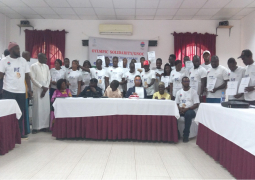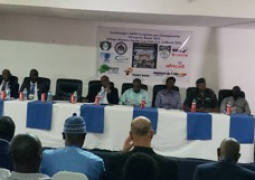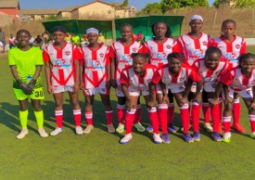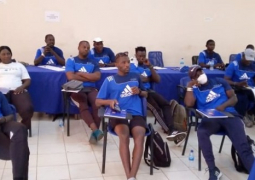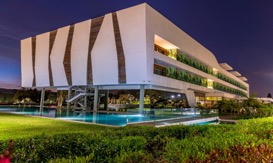
This is why Morocco is positioning to host the 2025 African Cup of Nations which was scheduled to be announced on Friday, February 10, 2023,by the Executive Committee of the Confederation of African Football (CAF)), but was postponed to a later date. The continent’s Football Governing body cited what it called “Logistical problems”. Several nations have shown interest following the withdrawal of Guinea in October 2022.Morocco, Algeria, Zambia, Nigeria/Benin for a co-organization are other contenders.
However, Morocco, which already enjoys the support of a number of African States, has an added advantage. These include an ambitious sports policy, hospitality and a vibrant transport sector, a vast experience in organizing football competition as well as an avid influence on African football.
The country's application profile includes six ultra-modern stadiums: Tangier (60,000 seats), Fes (35,000 seats), Rabat (45,000 seats), Casablanca 45,000 seats), Marrakech (45,000 seats) and Agadir (45,000 seats). "The choice of host cities meets the requirement of operational excellence, in terms of sports, residential and transport infrastructure, meeting CAF requirements.
In Morocco, football-related infrastructure abounds. The country has more than 200 standard synthetic pitches, around twenty stadiums with natural pitches and standard lighting.
These infrastructures have notably enabled Morocco to host this month the Club World Cup, won by Real Madrid. In recent years, it has also hosted the CHAN, the CAN U17 and U23, the women's CAN and also the Women's Champions League. The Kingdom also hosts, within the framework of cooperation between the FRMF and other federations on the continent, the international matches of several African teams.
Thus, Morocco presents solid arguments to host the Can 2025, almost 34 years after having organized this competition in 1988.
A Vibrant Sports Policy
(Photo: Mohammed VI Football Academy)
Morocco has a policy driven for several years by His Majesty King Mohamed VI in person, the country has acquired sports infrastructures, in quantity and quality. It is the only African country to have successfully passed the prerequisite required by FIFA concerning all the criteria established in its specifications such as sports, hotel, health infrastructure, etc. in order to be eligible for the organization of the World Cup in its new format with 48 teams.
The Kingdom also has the Mohammed VI Football Complex, one of the best national soccer centers in the world. This Academy which was opened in 2019, was described by FIFA as one of “the biggest and highest-achieving sports academies in the world”.
The training center housed in this complex is now a model in terms of training young footballers
In 2017, HM Mohammed VI outlined the Kingdom's strategy for the development of national sport. His message at the debate that took place in Skhirat organised by the Royal Moroccan Football Federation with the Confederation of African Football, made clear what the way forward was and that it could only be done by "improving the quality of training, developing infrastructures, providing requirements to enter the professional world and strengthening the marketing mechanisms of African football".
Morocco, a source of inspiration for African football
The feat achieved by the Atlas Lions recently in Qatar by reaching the semi-final stage of the World Cup, a first for an African nation, is another strong argument. The Moroccan Kingdom is a citadel of unparalleled influence in African football. The success of Moroccan clubs in CAF competition is well established. Top clubs are able to acquire huge budgets to keep domestic players at home and acquire talented players from sub-Saharan Africa who are attracted by larger paychecks and exposure. Moroccan clubs have recently acquired the prestige and money to draw top talents out of countries such as D.R. Congo, Mali, Nigeria, Ivory Coast, etc. to fulfill lofty continental ambitions and compete with other North African powers. The Royal Moroccan Football Federation (FRMF) is committed to developing through partnerships concluded since 2015 with 45 federations across the continent. In 2019, these partnerships were strengthened with a vast majority of Associations. This partnership revolves around several axis, which includes but not limited to; support in the construction of sports infrastructures, the exchange of best practices, the training of technical and administrative managers, the reception of preparation courses for national selections, but also arbitration and the organization of friendly matches between the different categories of national teams.
Morocco who has not organized a CAN since 1988, has certainly today enough to offer the continent the most beautiful competition ever organized.
Morocco, a true leader in tourism
Benefiting from a very strong experience in tourism, Morocco has been visited by well over 12 million tourists in 2019 and has a very rich hotel base in both quantity and quality. The 90,000 rooms distributed between the host cities can comfortably accommodate national teams, official delegations and supporters. According to the Moroccan football authorities, the hospitality offer in Morocco will make it possible to accommodate all the players in the competition by offering prices adapted to all budgets. The demand for quality in terms of mobility and transport is similarly guaranteed with dense air, rail and road networks.
Casablanca International Airport, a real African hub, is an asset in this sense, as is Royal Air Maroc, which is present in several countries, both in West Africa and in Central and East Africa, serving more than 82 destinations in Africa.
A CAN 2025 in Morocco will also give the chance to the African Diaspora to be at Moroocco 2025, with very affordable prices. Each host city has an international airport. Travel would also be comfortable by train, as the host cities are all connected by rail. Morocco has a high-speed LGV line linking Tangier and Casablanca which was inaugurated in 2018 by King Mohammed VI, a first in Africa.


